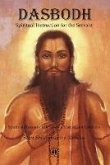Self-inquiry is about understanding the nature of suffering within oneself and its ending without resorting to any belief/authority. It seeks to understand what is world, mind, body, thought, action, experience, and death are. While most people do not find the need for this, some people do: at some point in their life. Based on their Karma, self-inquiry becomes one and the only important thing in the world to uncover the Truth: the Unborn Wholeness called Self, Brahman, Tao, Awareness or Emptiness in different traditions. This book is just one tool for self-discovery.
Karma Yoga - Swami Vivekananda discussed the concept of Karma in the Bhagavada Gita. Swami Vivekananda described Karma Yoga as a mental discipline that allows a person to carry out his/her duties as a service to the entire world, as a path to enlightenment.
Bhakti Yoga - Initially, Bhakti Yoga was meant to devote one's life to Krishna or/and his synonymous Personal Forms such as Vishnu and Rama (Chapter 12, Bhagavad Gita), however, through time, confusion and misunderstanding spread which resulted in diversification. towards other gods as well i.e- Ganesha, Kali, Durga, Shiva etc. This book clarifies some of the misconception.
Raja Yoga - Vivekananda adapted traditional Hindu ideas and religiosity to suit the needs and understandings of Western audiences, who were especially attracted by and familiar with Western esoteric traditions and movements like transcendentalism and New thought. An important element in his adaptation of Hindu religiosity was the introduction of his four yogas model, which includes Raja yoga, his interpretation of Patanjali's Yoga sutras, which offers a practical means to realize the divine force within, which is central to modern Western esotericism.
Jnana yoga is one of the types of yoga mentioned in Hindu philosophies. Jnana in Sanskrit means "knowledge"; the word is derived from Sanskrit jna - to know. In the book, Swami Vivekananda describes "knowledge" as the ultimate goal. According to Swami Vivekananda, freedom is the object of Jnana Yoga.
Karma Yoga - Swami Vivekananda discussed the concept of Karma in the Bhagavada Gita. Swami Vivekananda described Karma Yoga as a mental discipline that allows a person to carry out his/her duties as a service to the entire world, as a path to enlightenment.
Bhakti Yoga - Initially, Bhakti Yoga was meant to devote one's life to Krishna or/and his synonymous Personal Forms such as Vishnu and Rama (Chapter 12, Bhagavad Gita), however, through time, confusion and misunderstanding spread which resulted in diversification. towards other gods as well i.e- Ganesha, Kali, Durga, Shiva etc. This book clarifies some of the misconception.
Raja Yoga - Vivekananda adapted traditional Hindu ideas and religiosity to suit the needs and understandings of Western audiences, who were especially attracted by and familiar with Western esoteric traditions and movements like transcendentalism and New thought. An important element in his adaptation of Hindu religiosity was the introduction of his four yogas model, which includes Raja yoga, his interpretation of Patanjali's Yoga sutras, which offers a practical means to realize the divine force within, which is central to modern Western esotericism.
Jnana yoga is one of the types of yoga mentioned in Hindu philosophies. Jnana in Sanskrit means "knowledge"; the word is derived from Sanskrit jna - to know. In the book, Swami Vivekananda describes "knowledge" as the ultimate goal. According to Swami Vivekananda, freedom is the object of Jnana Yoga.
Dieser Download kann aus rechtlichen Gründen nur mit Rechnungsadresse in A, D ausgeliefert werden.









